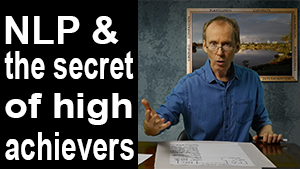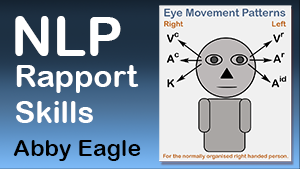
Learn how to use NLP to bring out the best in people by accessing positive states of mind then asking NLP Meta Model questions to keep the conversation focused on the positive... Phone 07 5562 5718 or send an email to book a free 20 minute telephone or Skype session with Abby Eagle. NLP Coaching, Hypnotherapy and Meditation. Gold Coast, Robina, Australia. Online NLP Coaching sessions on Skype and by phone also available.
Learn the Structure of Positive Thinking. How to Deal With a Problem and Get Your Desired Outcome
NLP Present State to Desired Outcome Model
Define the present state - build a well formed outcome - ask questions that expand your map of the world - be aware of what you don't want want but keep your mind focussed on what you do want - remain alert and watch your thoughts - shift from the negative to the positive - access resource states of curiosity, fascination and playfulness - ask open ended questions to gather information - in a personal relationship it may be useful to take your time in making a judgement and remain open to new possibilities.

Define the present state.
Present State What is the current situation? |
|
Desired Outcome - What do you want? - Why do you want the outcome? |
Start by spending some time on defining the problem but not too much time. The emphasis needs to be on building a NLP Well Formed Outcome. Use NLP Meta Model questions to map out the structure of the present state.
As you gather information listen for NLP Meta Programs and anything that indicates personality type preferences. Keep in mind the NLP Mind Lines Model.
Ask, "What is the problem specifically? When do you experience the problem? In what contexts? How is it a problem for you? What happens when...? How do you do the problem?"
We don't ask "Why?", about the problem, as to do so will take the client back into the problem and bring up a list of reasons and justifications for having the problem. "Why?", takes the person back into their past. It may be useful to know when a problem originated and the prior causes but there is little benefit to be obtained by dredging up the past and having the client relive memories. The client already knows what happened in the past - what they want to know now is how to let go the past and achieve a well formed outcome.
Watch the Video: How to Set a Goal using the WFO Questions
Click the Image to Watch on YouTube
Build a well formed outcome.
In building a well formed outcome we ask questions like, "What do you want for your self?" State the outcome in the positive. Get the evidence procedure for having achieved the desired outcome. What specifically will the client see, hear and feel when they have achieved their outcome?
Run the goal through a set of criteria to build a well formed outcome that is positive, reasonable, attainable and has meaning for the client. It is at this point that we can ask, "Why?" But now we are asking, "Why?",' about a desired outcome. We are not asking, "Why?", about a problem. When we ask "Why?" about a desired outcome we learn what is important to the client, and what motivates them.
Once we know 'what' the client wants and 'why' they want it we can start asking, "How?" That is, "Do you know what to do? Are you soley responsible for initiating the project and carrying it through to completion? Can you do it? Have you done this before? Do you know the steps and stages? Have you got an action plan? Do you have a way to monitor your progress? Do you know how to deal with the interferences? Do you have the resources - both internal and external? Are you in alignment within yourself? Is the outcome compelling? Are you willing to commit to action? So the focus is on what the client wants not what they don't want. Learn the well formed outcome model.
Shift the attention from the negative to the positive.
Negative Thinking Is this what I want to be thinking about? Is this thought useful? Does this thought serve me? If not then ask yourself, "What do I want to be thinking about?" What thoughts would serve me? |
|
Positive Thinking Focus on your goals. Ask yourself questions like: |
To get the focus onto the desired outcome the client may need to learn to shift their awareness from the negative to the positive. The key word and skill here is 'awareness', as without awareness people remain asleep and behave like robots. Awareness is required to realise that you have a problem, awareness is required to become aware of the thoughts that arise in the mind. All thoughts arise out of the unconscious mind. They are your thoughts. If the thoughts don't serve you then you have the option to keep those thoughts as they are or change the thoughts into something that will help you to achieve your most desired outcomes, whether that be a material goal or a state of mind and being.
At times it may be useful to focus on the negative but at other times you may want to focus on the positive. Focussing on the negative or the positive indicates use of a meta program. Different personality types have a preference for the negative or positive but most importantly you need the awareness to know what you are thinking and how you are thinking, and the awareness to know if the thought processes are useful in helping you to achieve the results that you want.
Having goals gives you something to focus the mind on. So if negative thoughts should arise then use this as an opportunity to shift the focus onto what you want.
Awareness is the key.
People talk about blocks and obstacles as if they are real but in fact they are just thoughts. Thoughts are just an internal representation that arises in the mind in pictures, sounds, words, feelings, smell or taste. Just because you have a thought does not mean that you have to act upon it. Thoughts are just thoughts. You are the one who gives the thought meaning. If the thoughts improve your life then keep thinking them. If the thoughts cause trouble then put them aside, don't fight with the thoughts, just watch them and they will lose their power.
Remember that you are not the thought, you are not the mind, you are the pure witnessing consciousness that is aware of the thought, as such you can choose to act upon the thought, you can learn to say 'no' to the thought in such a way that it no longer arises and you can choose to have new thoughts, positive thoughts that help you to enjoy life more and help you achieve your desired outcomes.
Learn to ask questions that bring out the best in people.
Some people experience anxiety about speaking in public because their attention is too much on them self, that is they become self conscious. Some people get into arguments with coworkers and family, especially teenagers because they lack good communication skills. What are the basics of good communication?
- Get the focus off your self and onto the other.
- Access a state of curiosity and fascination.
- Ask quality questions and gather information.
Start by eliciting values.
Ask questions about a relevant subject, for example, "What is important to you in life? What is important to you about this business deal? What is important to you in relationships, career, your job, what you do everyday, what you eat, how the dishes are washed, what you do for entertainment, the clothes you wear, where you live, your friends, what you achieve in life, how you make love, etc?
Don't stop but keep asking questions. So if inquiring about life values you might ask, "What is important to you in life?" The answer might be, 'friends'. So then you ask, "What else is important to you in life?" You get more information. You keep on asking questions until the respondent runs out of answers.
Next step is to ask questions about the previous answers, so now you ask, "What is important to you about friends, or why are friends important to you, or what do you believe about friends, or what do friends mean to you, etc? As before you keep on asking questions.
If they say that, 'friends are there for you in good and bad times', then you ask a question about that. Rather than doing a Mind Read and thinking we know what the other person means we ask questions to gain clarification of what the other means by their statement. In this way we build understanding and rapport.
Meta Questions.
Questions do not have to be asked in a linear fashion, you can ask them in any sequence. Most importantly ask open ended questions with a sense of curiosity and fascination. Over time your intuition will guide you in the most appropriate questions to ask. Practise asking:
- What is important to you in an 'x'? (Where 'x' is the subject or context.)
- What else is important to you? What else? What else?
- What is important to you about that?
- Why is that important to you?
- What does that mean to you?
- What do you think about that?
- What do you believe about that?
- Can you tell me more?
- What do you feel about that?
- Once you get to experience that then what do you get to have and to experience?
- Is that important to you?
Regarding states:
- Having 'x' what will that mean to you?
- Having 'x' what will that allow you to do?
- Having 'x' what will that allow you to have and to get?
- Having 'x' how will change who you are?
Regarding behaviours:
- What else could you do? What else? What else?
- Who do you need to be to do that behaviour and get that outcome?
So with a sense of curiosity and fascination gather information by asking open ended questions. This will keep you in a state of uptime, that is in sensory experience, in the present, in the here and now. By maintaining a process of inquiry we forget ourselves, self consciousness disappears, we are slow to judge others preferring to hold off on a conclusive opinion until we get just a bit more information.
Rather than telling people what to do learn to invite them to change their behaviour. In doing so we empower people to empower others.
How we ask the questions is also important.
Closed Questions: "Are you angry?" This question can only be answered with a 'yes' or a 'no'. It also implies that the person is angry, which may or may not be true, but in NLP terms it is classified as a Mind-Read.
Leading Questions: "Would you like to learn how to relax?" As well as being a closed question which can only be answered by yes or no, it is also a leading question that directs the other person to your desired outcome.
Open Ended Questions: "What is important to you right this moment?" Or, “How would you like to live your life?” Or, “Why is that important to you?” Or, “What does that mean to you?” These are open ended question. These types of question invites the listener to express something that is true for them. All the questioner is doing is gathering information, ideally from a space of playful curiosity and fascination.
References: see the bibliography
If you are interested in NLP Coaching then contact Abby Eagle using the contact form on this page.
Share With Friends













